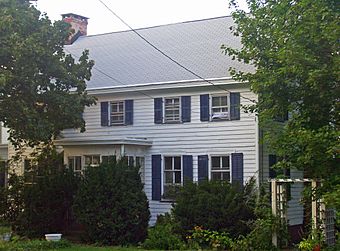The Homestead (Haverstraw, New York) facts for kids
Quick facts for kids |
|
|
The Homestead
|
|

West elevation, 2008
|
|
| Location | Haverstraw, New York |
|---|---|
| Nearest city | Peekskill |
| Built | ca. 1800 |
| NRHP reference No. | 83004154 |
| Added to NRHP | 1983 |
The Homestead is a very old and important house located on Hudson Avenue in the village of Haverstraw, New York. It was built a long time ago, around the early 1800s, making it one of the oldest buildings in the village.
Over the years, many important local people have lived in this house. It has been owned by two different families for a long time. The house has changed a little bit, for example, what was once the front of the house is now the back! But it still looks mostly the same as it did a long time ago. In 1983, The Homestead was added to the National Register of Historic Places, which means it's a special building worth protecting.
Contents
Exploring The Homestead's Design
The Homestead sits on a large piece of land, about 135 feet by 155 feet, on the east side of Hudson Avenue. This area is mostly homes, with some apartment buildings nearby. The ground slopes down towards the Hudson River on the east side. This means you can see the house's basement from that side.
The house has two floors and is made of wood, covered with horizontal wooden boards called clapboard. It has a pointed roof, known as a gabled roof, covered with asphalt shingles. A small kitchen area sticks out from the back of the house.
All the windows have wooden shutters on the sides. The main door is inside a small, enclosed porch. The inner doors have pretty rose-colored glass. On the east side of the house, there's a two-story porch with square posts and a small gable on its roof. The basement level of this porch has a door with side windows and a window above it. The first floor's double door has small columns and a decorative frame.
Inside, the house's layout is still the same as when it was built. Most of the rooms are simply decorated. However, the main hallway and the big rooms on the first floor have fancy designs inspired by classical styles.
The Homestead's Long History
Around the time of the American Revolution, most of the land where Haverstraw is today belonged to two farmers. One of them, John Denoyelles, gave his land to his son Peter just before the war. Peter Denoyelles was an important person who later served in the New York State government and even in the United States Congress. He built The Homestead around the early 1800s, though no one knows the exact year. Peter was interested in the Methodist religion, so early Methodist preachers often met at The Homestead.
Changing Owners Through the Years
When Peter passed away, he left the house to his brother Asbury, who was the county sheriff at the time. In 1853, Asbury sold the house to his brother George. This was just a year before the village of Haverstraw officially became a village. Soon after, George sold the house to Edward Pye, who became the first president of the Haverstraw Village Board. Edward Pye later became a judge and served in the state army. In 1861, when the American Civil War was starting, Edward Pye sold the house to his brother Isaac. Edward Pye later died fighting in the war.
Isaac didn't own the house for very long. In 1863, he sold it to a lawyer named Abraham Conger. Seven years later, George Snedeker bought it. George passed away in 1873 and left the house to his wife. She lived there until she died in 1901. Their son, Samuel, inherited the house, and then in 1914, he passed it to his sister, Lucretia Fowler. She sold it a year later to a person named Abbie Kennedy.
Modern Changes to The Homestead
Abbie Kennedy lived in The Homestead until 1937, when she sold it to Aloysius Lynch. Aloysius Lynch was a superintendent for the Haverstraw schools for many years. He made many needed repairs and updates to the house. He also made the windows on the east and west sides shorter. As the area around Haverstraw grew more like a suburb in the 1900s, new streets were built where there used to be farmland. Hudson Avenue was built in a way that meant the back of The Homestead had to become the front of the house!
 | May Edward Chinn |
 | Rebecca Cole |
 | Alexa Canady |
 | Dorothy Lavinia Brown |



